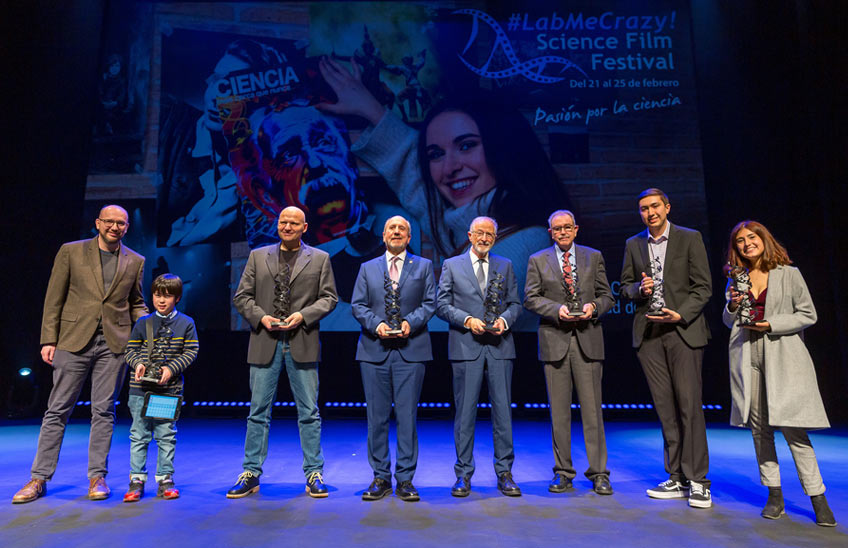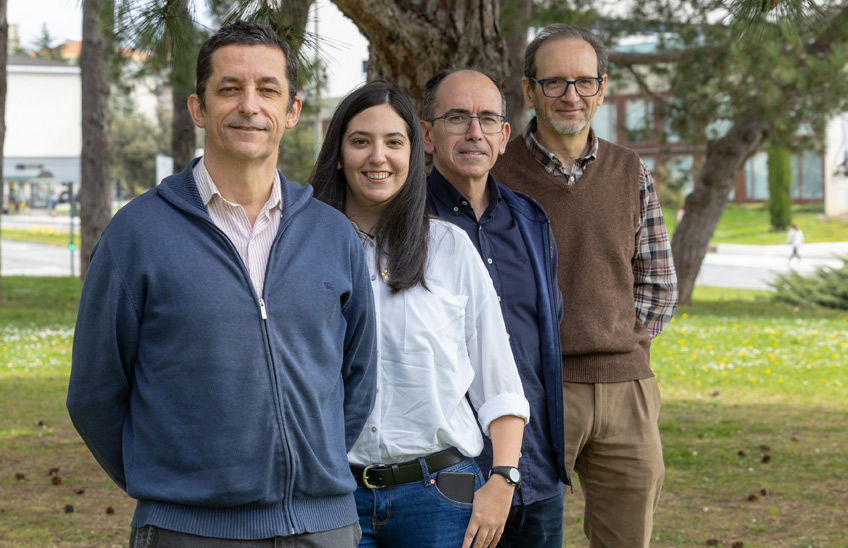"The Reason I Jump", reflecting non-verbal autism disorder, best documentary at #LabMeCrazy! Science Film Festival
The Science Museum of the University of Navarra honours researchers Luis Enjuanes, Mariano Esteban and Vicente Larraga with the award Pasión por la Ciencia; "The Science of an Extreme Animal Athlete", best video on the web or social networks; and "GastroCiencia" award of the public.

FotoManuel Castells<br>/Premiados en la III edición del festival internacional de cine científico #LabMeCrazy!
24 | 02 | 2022
Once again this year, science had its great expression on the big screen. Spectators of all ages, authorities, teachers, schoolchildren, the media, speech, university students, etc. came together to show, once again, that science belongs to everyone and can be exciting.
The 3rd edition of the international scientific film festival #LabMeCrazy! organised every year by the Science Museum of the University of Navarra, took place in Pamplona from 21st to 25th February, and brought together the best audiovisual productions on science, as well as a series of activities to bring science closer to the general public.
Bienvenido León, director of the festival, has highlighted the good reception of the public in this new edition: "We have seen some magnificent films on various topics such as, for example, the arrival of man on the moon or the research on cancer. And the parallel activities have been great fun: we have looked for urban fossils or invasive species in our rivers, with good participation from the public. This week has been a celebration in which we hope we have managed to awaken a passion for science".
The final awards gala, submission , which was held yesterday at 19:00 in the theatre of the University of Navarra Museum,was attended by Alberto Vivó, researcher , who acted as master of ceremonies and introduced the winners in the different categories.
The award for best documentary went to "The Reason I Jump", an 82-minute British-American production that takes a different look at autism. The best television programme went to the German production "World of Viruses"; the best student production was the Costa Rican "Moon Landing"; the best work produced by universities went to "The Artificial Revolution"; while the best video on the web or social networks went to the American producers of "The Science of an Extreme Animal Athlete". CSIC researchers Luis Enjuanes, Mariano Esteban and Vicente Larraga were awarded the award "Passion for Science" prize for their scientific career and for leading the Spanish COVID-19 vaccine projects. The public recognition went to the "GastroCiencia" programme of the University of Murcia.
Also taking part in the awards ceremony at submission were Juan Cruz Cigudosa, Regional Minister for University, Innovation and Digital Transformation of the Government of Navarra; Ana Elizalde, Deputy Mayor of Pamplona City Council; Pello Bayona, director of companies of Navarra in Laboral Kutxa; Isabel Bistué, delegate of the University of Navarra; Lluís Montoliú, researcher of the CSIC; Bienvenido León, director from the festival, and Ignacio López-Goñi, director from the Science Museum of the University of Navarra. At the end of submission , the winning film in the documentary category was screened.
#LabMeCrazy! Science Film Festival received 1,371 productions from 104 countries in its third edition. The final jury was made up of professionals from different disciplines: Rebeca Fernández, sales director of Off the Fence (Netherlands); the American filmmaker Jaime Jacobsen; Mónica González Alonso, student of doctorate at the University of Navarra; the scientist and populariser Lluís Montoliú; and Samuel Negredo, professor at School of speech at the University of Navarra.
"The Reason I Jump: "I never dreamed this was possible".
"The Reason I Jump" - a documentary based on the book "The Reason I Jump" by Naoki Higashida -narrates the non-verbal autism disorder, through the testimonies of different families with children suffering from this mental condition.
The documentary sample shows the difficulty experienced by people with non-verbal autism in a world they are part of but which, nevertheless, does not understand them: their brain is not able to order memories chronologically; they perceive reality in a different way; they become obsessed with different experiences; they feel frustration for not being able to express what they feel; they may experience feelings of uselessness; they react physically to feelings of sadness and happiness; and sometimes they may show aggressiveness. In the documentary we see, for example, this testimony of a case of non-verbal autism: "My mind is constantly swinging from one side to the other. Wherever I am, I am never at ease meeting ".
This production also narrates the difficulties faced by parents who have children with this disorder subject as they sometimes do not know how to act, but above all they express concern about the uncertainty of the future, i.e. not having the guarantee that the world to come will take care of their children.
The film also tells about the advances that science and society have made regarding non-verbal autism, such as the possibility of expressing themselves through the spelling of words: "I never dreamt that this would be possible", says one of the testimonies of the documentary.
Jim Fujiwara is an 11-year-old boy who suffers from non-speaking autism and is the subject of the film "The Reason I Jump". At the awards submission , his father, Peter, emphasised the service that science provides to human beings: "Thanks to a better understanding of autism and recent scientific advances, Jim has been able to make himself heard and now communicates through a specialised app on an iPad".
"The Reason I Jump is an excellent example of how science and technology can help solve specific problems of citizens. In this case, enabling speech for children with non-verbal autism.


